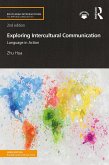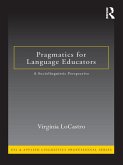Teaching and Learning Second Language Pragmatics for Intercultural Understanding (eBook, ePUB)
Redaktion: Mcconachy, Troy; Liddicoat, Anthony J.
41,95 €
41,95 €
inkl. MwSt.
Sofort per Download lieferbar

21 °P sammeln
41,95 €
Als Download kaufen

41,95 €
inkl. MwSt.
Sofort per Download lieferbar

21 °P sammeln
Jetzt verschenken
Alle Infos zum eBook verschenken
41,95 €
inkl. MwSt.
Sofort per Download lieferbar
Alle Infos zum eBook verschenken

21 °P sammeln
Teaching and Learning Second Language Pragmatics for Intercultural Understanding (eBook, ePUB)
Redaktion: Mcconachy, Troy; Liddicoat, Anthony J.
- Format: ePub
- Merkliste
- Auf die Merkliste
- Bewerten Bewerten
- Teilen
- Produkt teilen
- Produkterinnerung
- Produkterinnerung

Bitte loggen Sie sich zunächst in Ihr Kundenkonto ein oder registrieren Sie sich bei
bücher.de, um das eBook-Abo tolino select nutzen zu können.
Hier können Sie sich einloggen
Hier können Sie sich einloggen
Sie sind bereits eingeloggt. Klicken Sie auf 2. tolino select Abo, um fortzufahren.

Bitte loggen Sie sich zunächst in Ihr Kundenkonto ein oder registrieren Sie sich bei bücher.de, um das eBook-Abo tolino select nutzen zu können.
This collection argues for the need to promote intercultural understanding as a clear goal for teaching and learning pragmatics in second and foreign language education.
- Geräte: eReader
- mit Kopierschutz
- eBook Hilfe
Andere Kunden interessierten sich auch für
![Teaching and Learning Pragmatics (eBook, ePUB) Teaching and Learning Pragmatics (eBook, ePUB)]() Noriko IshiharaTeaching and Learning Pragmatics (eBook, ePUB)39,95 €
Noriko IshiharaTeaching and Learning Pragmatics (eBook, ePUB)39,95 €![Teaching and Testing Second Language Pragmatics and Interaction (eBook, ePUB) Teaching and Testing Second Language Pragmatics and Interaction (eBook, ePUB)]() Carsten RoeverTeaching and Testing Second Language Pragmatics and Interaction (eBook, ePUB)40,95 €
Carsten RoeverTeaching and Testing Second Language Pragmatics and Interaction (eBook, ePUB)40,95 €![The Routledge Handbook of Second Language Acquisition and Pragmatics (eBook, ePUB) The Routledge Handbook of Second Language Acquisition and Pragmatics (eBook, ePUB)]() The Routledge Handbook of Second Language Acquisition and Pragmatics (eBook, ePUB)48,95 €
The Routledge Handbook of Second Language Acquisition and Pragmatics (eBook, ePUB)48,95 €![Redefining Tandem Language and Culture Learning in Higher Education (eBook, ePUB) Redefining Tandem Language and Culture Learning in Higher Education (eBook, ePUB)]() Redefining Tandem Language and Culture Learning in Higher Education (eBook, ePUB)50,95 €
Redefining Tandem Language and Culture Learning in Higher Education (eBook, ePUB)50,95 €![Exploring Intercultural Communication (eBook, ePUB) Exploring Intercultural Communication (eBook, ePUB)]() Zhu HuaExploring Intercultural Communication (eBook, ePUB)39,95 €
Zhu HuaExploring Intercultural Communication (eBook, ePUB)39,95 €![Teaching and Learning Pragmatics (eBook, PDF) Teaching and Learning Pragmatics (eBook, PDF)]() Noriko IshiharaTeaching and Learning Pragmatics (eBook, PDF)39,95 €
Noriko IshiharaTeaching and Learning Pragmatics (eBook, PDF)39,95 €![Pragmatics for Language Educators (eBook, ePUB) Pragmatics for Language Educators (eBook, ePUB)]() Virginia LocastroPragmatics for Language Educators (eBook, ePUB)57,95 €
Virginia LocastroPragmatics for Language Educators (eBook, ePUB)57,95 €-
-
-
This collection argues for the need to promote intercultural understanding as a clear goal for teaching and learning pragmatics in second and foreign language education.
Hinweis: Dieser Artikel kann nur an eine deutsche Lieferadresse ausgeliefert werden.
Dieser Download kann aus rechtlichen Gründen nur mit Rechnungsadresse in A, B, BG, CY, CZ, D, DK, EW, E, FIN, F, GR, HR, H, IRL, I, LT, L, LR, M, NL, PL, P, R, S, SLO, SK ausgeliefert werden.
Hinweis: Dieser Artikel kann nur an eine deutsche Lieferadresse ausgeliefert werden.
Produktdetails
- Produktdetails
- Verlag: Taylor & Francis eBooks
- Seitenzahl: 242
- Erscheinungstermin: 29. November 2021
- Englisch
- ISBN-13: 9781000482997
- Artikelnr.: 62751289
- Verlag: Taylor & Francis eBooks
- Seitenzahl: 242
- Erscheinungstermin: 29. November 2021
- Englisch
- ISBN-13: 9781000482997
- Artikelnr.: 62751289
- Herstellerkennzeichnung Die Herstellerinformationen sind derzeit nicht verfügbar.
Troy McConachy is Associate Professor in Applied Linguistics at University of Warwick, UK. His research focuses on how the teaching and learning of L2 pragmatics can contribute to intercultural understanding, looking at the relationship between pragmatics and culture, metapragmatic awareness, classroom discourse, and teacher education. Anthony J. Liddicoat is Professor in the Department of Applied Linguistics at University of Warwick, UK, and Adjunct Professor in Justice and Society at the University of South Australia. His research interests include issues relating to the teaching and learning of intercultural capabilities in language education and language policy and planning.
Contents
List of Tables, Figures and Appendices
Contributors
Introduction: Second language pragmatics for intercultural understanding
TROY MCCONACHY AND ANTHONY J. LIDDICOAT
1. Negotiating politeness practices and interpersonal connections in L2 Japanese: Insights from study abroad narratives
Troy McConachy and Hanako Fujino
2. "But in England they're certainly very polite, so you mustn't forget that": Young EFL learners making sense of pragmatic practices
Milica Savic and Anders Myrset
3. Exploring framing categories in language learners' intercultural positioning: "Asia" and "the West"
Barbara Pizziconi
4. Literary pragmatics and intercultural dialogue in the beginning language class: A study in social reading
Peju Alfred and Chantelle Warner
5. Mixed-culture discussion activities as a tool for developing pragmatic and intercultural awareness
Andrew Barke and Momoyo Shimazu
6. Concept-Based Instruction for teaching and learning L2 (im)politeness
Natalia Morollón-Martí
7. Co-constructing non-essentialist pedagogy: Supporting teachers to support learners' translingual agency through L2 pragmatics instruction
Noriko Ishihara and Adriana Porcellato
8. Intercultural competence and pragmatics in the L2 classroom: Views of in-service EFL teachers in primary, secondary, and adult education
Gila A. Schauer
9. Towards a new measurement of intercultural competence: Assessing the pragmatic competence of intercultural speakers
Ariadna Sánchez-Hernández and Carmen Maíz-Arévalo
List of Tables, Figures and Appendices
Contributors
Introduction: Second language pragmatics for intercultural understanding
TROY MCCONACHY AND ANTHONY J. LIDDICOAT
1. Negotiating politeness practices and interpersonal connections in L2 Japanese: Insights from study abroad narratives
Troy McConachy and Hanako Fujino
2. "But in England they're certainly very polite, so you mustn't forget that": Young EFL learners making sense of pragmatic practices
Milica Savic and Anders Myrset
3. Exploring framing categories in language learners' intercultural positioning: "Asia" and "the West"
Barbara Pizziconi
4. Literary pragmatics and intercultural dialogue in the beginning language class: A study in social reading
Peju Alfred and Chantelle Warner
5. Mixed-culture discussion activities as a tool for developing pragmatic and intercultural awareness
Andrew Barke and Momoyo Shimazu
6. Concept-Based Instruction for teaching and learning L2 (im)politeness
Natalia Morollón-Martí
7. Co-constructing non-essentialist pedagogy: Supporting teachers to support learners' translingual agency through L2 pragmatics instruction
Noriko Ishihara and Adriana Porcellato
8. Intercultural competence and pragmatics in the L2 classroom: Views of in-service EFL teachers in primary, secondary, and adult education
Gila A. Schauer
9. Towards a new measurement of intercultural competence: Assessing the pragmatic competence of intercultural speakers
Ariadna Sánchez-Hernández and Carmen Maíz-Arévalo
Contents
List of Tables, Figures and Appendices
Contributors
Introduction: Second language pragmatics for intercultural understanding
TROY MCCONACHY AND ANTHONY J. LIDDICOAT
1. Negotiating politeness practices and interpersonal connections in L2 Japanese: Insights from study abroad narratives
Troy McConachy and Hanako Fujino
2. "But in England they're certainly very polite, so you mustn't forget that": Young EFL learners making sense of pragmatic practices
Milica Savic and Anders Myrset
3. Exploring framing categories in language learners' intercultural positioning: "Asia" and "the West"
Barbara Pizziconi
4. Literary pragmatics and intercultural dialogue in the beginning language class: A study in social reading
Peju Alfred and Chantelle Warner
5. Mixed-culture discussion activities as a tool for developing pragmatic and intercultural awareness
Andrew Barke and Momoyo Shimazu
6. Concept-Based Instruction for teaching and learning L2 (im)politeness
Natalia Morollón-Martí
7. Co-constructing non-essentialist pedagogy: Supporting teachers to support learners' translingual agency through L2 pragmatics instruction
Noriko Ishihara and Adriana Porcellato
8. Intercultural competence and pragmatics in the L2 classroom: Views of in-service EFL teachers in primary, secondary, and adult education
Gila A. Schauer
9. Towards a new measurement of intercultural competence: Assessing the pragmatic competence of intercultural speakers
Ariadna Sánchez-Hernández and Carmen Maíz-Arévalo
List of Tables, Figures and Appendices
Contributors
Introduction: Second language pragmatics for intercultural understanding
TROY MCCONACHY AND ANTHONY J. LIDDICOAT
1. Negotiating politeness practices and interpersonal connections in L2 Japanese: Insights from study abroad narratives
Troy McConachy and Hanako Fujino
2. "But in England they're certainly very polite, so you mustn't forget that": Young EFL learners making sense of pragmatic practices
Milica Savic and Anders Myrset
3. Exploring framing categories in language learners' intercultural positioning: "Asia" and "the West"
Barbara Pizziconi
4. Literary pragmatics and intercultural dialogue in the beginning language class: A study in social reading
Peju Alfred and Chantelle Warner
5. Mixed-culture discussion activities as a tool for developing pragmatic and intercultural awareness
Andrew Barke and Momoyo Shimazu
6. Concept-Based Instruction for teaching and learning L2 (im)politeness
Natalia Morollón-Martí
7. Co-constructing non-essentialist pedagogy: Supporting teachers to support learners' translingual agency through L2 pragmatics instruction
Noriko Ishihara and Adriana Porcellato
8. Intercultural competence and pragmatics in the L2 classroom: Views of in-service EFL teachers in primary, secondary, and adult education
Gila A. Schauer
9. Towards a new measurement of intercultural competence: Assessing the pragmatic competence of intercultural speakers
Ariadna Sánchez-Hernández and Carmen Maíz-Arévalo







